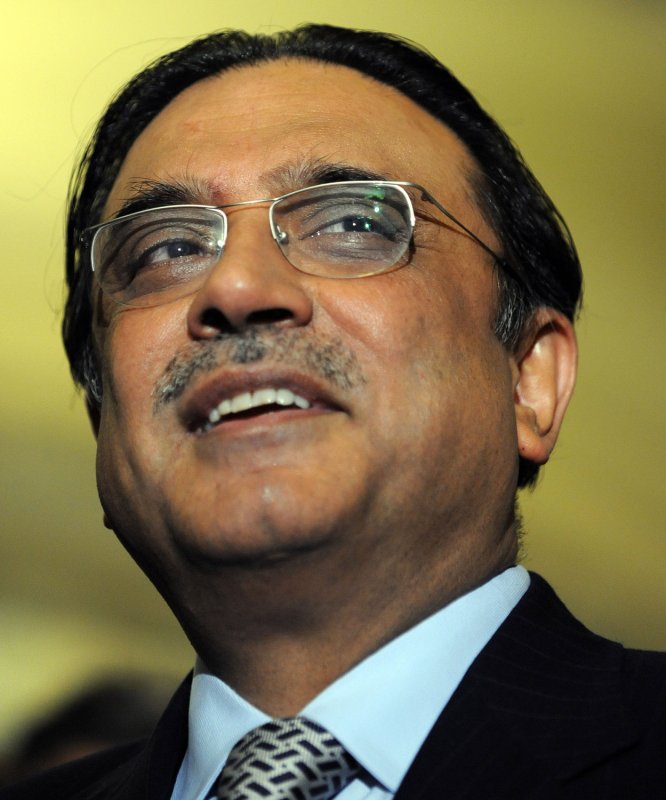Pakistani President Asif Ali Zardari speaks to the media after meeting with Sen. Richard Lugar, R-IN, Sen. John Kerry, D-MA, Afghan President Hamid Karzai, and other Senators on Capitol Hill in Washington on May 7, 2009. (UPI Photo/Roger L. Wollenberg) |
License Photo
NEW DELHI, June 16 (UPI) -- The twin summits this week in Russia provide a venue for Indian Prime Minister Manmohan Singh and Pakistani President Asif Ali Zardari to meet, but whether that will revive suspended talks between their nations as sought by the United States cannot be answered.
Singh and Zadari will be at the Shanghai Cooperation Organization summit and that of the four emerging economies of Brazil, Russia, India and China, also known as BRIC. India is an observer at the SCO, as is Pakistan.
The summits come a week after the India visit of U.S. President Barack Obama's Undersecretary of State William Burns, who, various Indian media reports said, traveled to urge the resumption of talks between India and Pakistan, talks that were canceled after last November's terrors attacks in which about 180 people were killed in India's financial capital Mumbai.
India claims the attacks were planned on Pakistani territory and insists talks for normalization of relations cannot resume unless the Zardari government takes action against those who New Delhi says were responsible for the Mumbai carnage. Pakistan says India hasn't provided enough evidence to support its claims.
The U.S. interest in the resumption of talks is part of Obama's Afghanistan-Pakistan policy and stems from its concern that Pakistan, which is being ravaged by international violence almost on a daily basis, cannot do enough to the Taliban if it diverts most of its militant resources toward India.
There has been much talk in India that the new U.S. administration wants to put pressure on New Delhi to resume the talks but is not doing enough of the same to convince Islamabad to take action against those allegedly involved in the Mumbai attacks.
It is in this political climate that Singh and the beleaguered Zardari head for Russia, and no one seems clear on the outcome of any such meeting between the leaders.
India appears relieved by reported assurances from the Obama administration that, while it favors resumption of talks, it has no plans to appoint a special envoy to deal with Kashmir, to which both India and Pakistan have laid claim since they were founded in 1947. India says the province is a settled issue, while Pakistan says the dispute is the key to improving relations.
An appointment of a special Kashmir envoy, which had been rumored, would certainly have strained Indo-U.S. relations after being put on a strong footing by the administration of U.S. President George W. Bush.
Prior to Burns' India visit, Singh had expressed India's willingness to meet Pakistan "more than halfway" if Islamabad took strong, effective and sustained action against militants.
India is also incensed that there hasn't been enough global reaction to a recent Pakistan court order releasing Hafiz Mohammed Saeed, who was put under house arrest after the Mumbai violence. India says Saeed, a founder of the banned Lashkar-e-Toiba terror group, is one of the people who planned the attacks.
The Pakistani government said it was a court and not the government that ordered his release, but New Delhi charges Saeed's release is another example that raises questions about Islamabad's sincerity in fighting terrorists and terror groups operating from Pakistan.
An editorial in The Times of India said, "The U.S. has a stake in stabilizing Pakistan if it is to beat the Taliban in the Af-Pak region, so goes the argument used by proponents of more aid to Pakistan. President Barack Obama's approach appears well-intended. By assisting Pakistan to rebuild its schools, hospitals and other civilian infrastructure, the U.S. is keen to win some support from the Pakistani public, large sections of which deeply dislike America. However, the best of U.S. intentions will not help Pakistan unless our neighbor decides to help itself."





